Cookie recipes to kick start your week
June 5th, 2011 by Admin
How about we finish off this gorgeous weekend with some sweets? Urban Grains member Meg Whetung has kindly shared two cookie recipes with us. Both came to her via Molly Wizenberg’s blog, Orangette, a delectable little corner of the internet written from Seattle, Washington (where you can also find more background on these recipes).
Meg has used Urban Grains flour in both of these recipes, which call for whole grain flours, with great results. If you’re trying either of them out, why not send us a note or photos to share your results!
Whole Wheat Sablés with Cacao Nibs
From Alice Medrich’s Chewy Gooey Crispy Crunchy Melt-in-Your-Mouth Cookies
2 cups (9 oz.) whole wheat pastry flour, OR 1 cup (4.5 oz.) all-purpose flour plus 1 scant cup (4 oz.) whole
wheat flour
14 Tbsp. (1 ¾ sticks) unsalted butter, softened
½ cup (3 ½ oz.) sugar
¼ tsp. salt
1 tsp. vanilla extract
1/3 cup (about 1 ¼ oz.) roasted cacao nibs
If using the two flours, combine them in a bowl, and mix with a whisk or fork.
In a medium bowl, with a large spoon or an electric mixer, beat the butter with the sugar, salt, and
vanilla until smooth and creamy but not fluffy, about 1 minute (with the mixer). Scrape down the sides
of the bowl with a spatula, and add the nibs. Beat briefly to incorporate. Add the flour, and mix until
just incorporated. Scrap the dough into a mass and, if necessary, knead it a little with your hands to
make sure that the flour is completely incorporated. Form the dough into a 12-by-2-inch log. Wrap and
refrigerate for at least 2 hours, or overnight.
Set racks in the upper and lower thirds of the oven, and preheat the oven to 350°F. Line 2 cookie sheets
with parchment paper.
Use a sharp knife to cut the cold dough log into ¼-inch-thick slices. Place the cookies at least 1 ½ inches
apart on the prepared sheet pans.
Bake for 12 to 14 minutes, or until the cookies are light golden brown at the edges, rotating the pans
from top to bottom and front to back halfway through the baking time. Cool the cookies for a minute
on the pans, then transfer them (with or without their parchment) to a rack to cool completely. Repeat
with remaining dough.
These cookies are good on the first day, but they’re best with a little age, after at least a day or two.
Store in an airtight container at room temperature for up to a month.
Yield: about 48 cookies
Whole Wheat Chocolate Chip Cookies
Adapted from Good to the Grain, by Kim Boyce
3 cups whole wheat flour (see note above)
1 ½ tsp. baking powder
1 tsp. baking soda
1 ½ tsp. kosher salt
2 sticks (8 oz.) unsalted butter, cut into ½-inch cubes (see note above)
1 cup lightly packed dark brown sugar
1 cup sugar
2 large eggs
1 tsp. vanilla extract
8 oz. bittersweet chocolate, roughly chopped into ¼- and ½-inch pieces, or bittersweet chips
Position racks in the upper and lower thirds of the oven, and preheat to 350°F. Line two baking sheets
with parchment. (If you have no parchment, you can butter the sheets.)
Combine the flour, baking powder, baking soda, and salt in a medium bowl, and whisk to blend.
Put the butter and sugars in the bowl of a stand mixer fitted with the paddle attachment. With the mixer
on low speed, mix just until the butter and sugars are blended, about 2 minutes. Scrape down the sides
of the bowl with a spatula. Add the eggs one at a time, beating well after each addition. Beat in the
vanilla. Add the flour mixture to the bowl, and blend on low speed until the flour is just incorporated.
Scrape down the sides and bottom of the bowl. Add the chocolate, and mix on low speed until evenly
combined. (If you have no stand mixer, you can do all of this with handheld electric beaters and/or a
large, sturdy spoon.) Scrape down the sides and bottom of the bowl, and then use your hands to turn
and gently massage the dough, making sure all the flour is absorbed.
Scoop mounds of dough about 3 tablespoons in size onto the baking sheets, leaving about 3 inches
between each cookie. (I was able to fit about 8 cookies on each sheet, staggering them in three rows.)
Bake the cookies for 16 to 20 minutes, rotating the sheets halfway through, until the cookies are evenly
browned. Transfer the cookies, still on parchment, to a rack to cool. Repeat with remaining dough.
These cookies are very good while still warm from the oven, but I find that you can taste the wheat
more – in a good way – once they’ve cooled.
Yield: about 20 cookies
- Comments Off on Cookie recipes to kick start your week
- Posted in Recipes




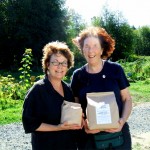

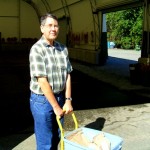




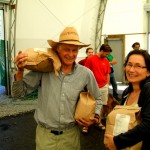

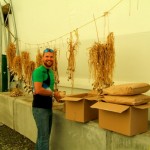


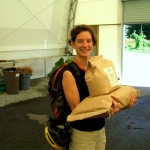

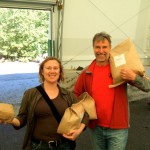




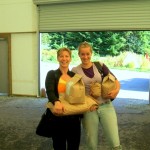
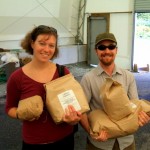


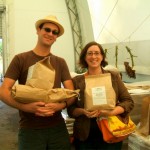









 The dessert case. Yum.
The dessert case. Yum. Tapestry above the stairs.
Tapestry above the stairs. The raw ingredients.
The raw ingredients. Good motto.
Good motto. Even better mascot.
Even better mascot.